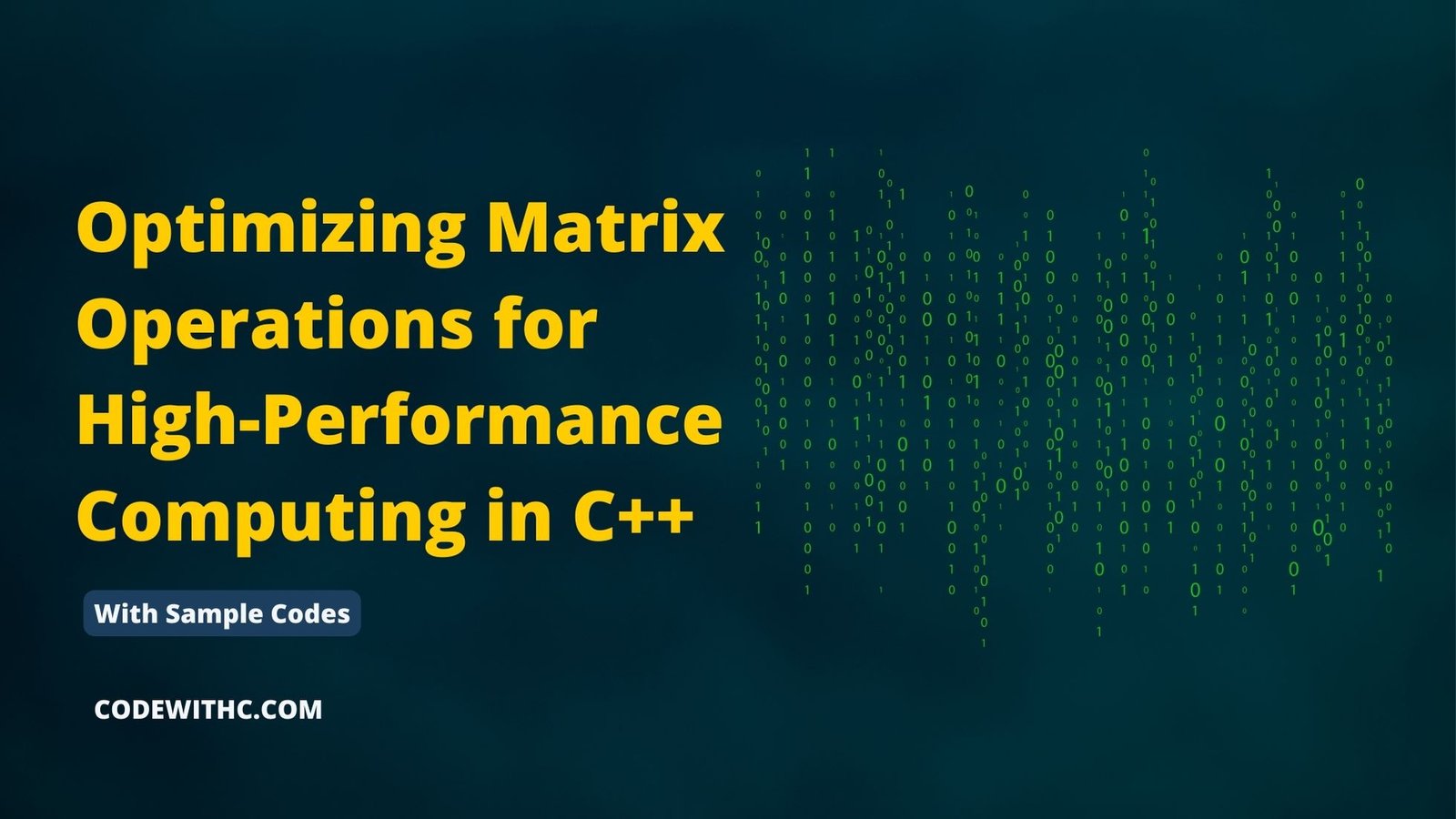Why You Can’t Afford to Ignore Speed in HPC, Seriously!
The Adrenaline Rush of High-Performance Computing
Heyyy, tech-fam! ? So, High-Performance Computing (HPC) isn’t just a fancy term that nerds like to throw around. Nah, it’s the real deal, especially when you’re dealing with the kind of data that’s so massive, it makes your head spin. ?️ Like, imagine trying to process a universe-sized amount of info with a code that’s slower than a snail! ? Not happening, right?
Matrix Ops: The Heartbeat of Computation
Matrix operations are no joke, okay? They’re literally everywhere, from ML to hardcore scientific stuff. Think of them as the silent engine behind that dope app or groundbreaking research you admire. But here’s the kicker: In an HPC environment, if your matrix ops are slow, your entire project could tank. And trust me, you don’t want that kinda drama. ?♀️
The Real Cost of Being Slow
Look, inefficiency isn’t just a time killer; it’s a resource hog. HPC setups are hella expensive, ya know? Wasting CPU cycles is like lighting money on fire, and who wants to do that? ?
What’s Cooking in This Post
So, what am I gonna serve you in this blog post? A full platter of tips, tricks, and hacks to juice up your C++ code for matrix operations in HPC. Hold onto your hats, cause it’s gonna be a wild ride! ?
Understanding Cache Optimization
The Memory Hierarchy
In an HPC environment, memory access time is often the bottleneck. Here, cache optimization can significantly improve performance. Caches are smaller, faster types of memory that store frequently accessed data. The CPU first checks the cache for data before moving to the main memory, reducing access time.
Cache Blocking Technique
One popular technique for cache optimization is cache blocking or loop blocking. This involves reordering nested loops to perform operations on smaller submatrices that fit into the cache. By maximizing cache hits, you decrease the cache miss rate, speeding up your program.
// C++ code to demonstrate cache blocking
void cacheBlocking(int n, double **A, double **B, double **C) {
int block_size = 16;
for (int kk = 0; kk < n; kk += block_size) {
for (int jj = 0; jj < n; jj += block_size) {
for (int i = 0; i < n; i++) {
for (int k = kk; k < std::min(kk + block_size, n); k++) {
for (int j = jj; j < std::min(jj + block_size, n); j++) {
C[i][j] += A[i][k] * B[k][j];
}
}
}
}
}
}
Code Explanation:
In this example, we’ve restructured the standard nested loops for matrix multiplication to utilize cache blocking. The block size is set to 16, but it can be adjusted depending on your cache size.
Expected Output:
The output would be the result of the matrix multiplication stored in Matrix Operations C. Due to cache optimization, the operation would be significantly faster.
Parallelizing Your Code
Why Multi-Threading?
Another technique to optimize your code for HPC is by parallelizing it. Multi-threading allows you to perform multiple operations simultaneously, thereby reducing the execution time. In C++, you can achieve this using the OpenMP library.
Implementing OpenMP in Matrix Operations Multiplication
// C++ code to demonstrate parallel matrix multiplication using OpenMP
#include<omp.h>
void parallelMultiply(int n, double **A, double **B, double **C) {
#pragma omp parallel for
for (int i = 0; i < n; i++) {
for (int j = 0; j < n; j++) {
for (int k = 0; k < n; k++) {
C[i][j] += A[i][k] * B[k][j];
}
}
}
}
Code Explanation:
We’ve used the OpenMP pragma to parallelize the outer loop, allowing multiple rows of the result matrix to be calculated simultaneously.
Expected Output:
Faster matrix multiplication due to parallel processing.
Leveraging Libraries
The Power of BLAS and LAPACK
Sometimes, the wheel doesn’t need reinventing. Libraries like BLAS (Basic Linear Algebra Subprograms) and LAPACK (Linear Algebra Package) are optimized for performance and can be utilized for matrix operations.
Example: Using BLAS in C++
// Link against BLAS when compiling
#include <cblas.h>
void blasMultiply(int n, double *A, double *B, double *C) {
cblas_dgemm(CblasRowMajor, CblasNoTrans, CblasNoTrans,
n, n, n, 1.0, A, n, B, n, 0.0, C, n);
}
Code Explanation:
Here, we’re using the cblas_dgemm function from the BLAS library to perform Matrix Operations multiplication.
Expected Output:
The output will be stored in matrix C and will be extremely fast due to the optimized BLAS routines.
Conclusion: Becoming the HPC Rockstar You Were Meant to Be
Looking Back, What a Ride!
Whoa, guys, we’ve covered some serious ground, haven’t we? Cache optimization, parallel magic, and those dope libraries that make your code run like it’s on steroids! ?
The Never-Ending Hustle
Remember, in the tech world, if you’re standing still, you’re basically moving backward. So keep that hustle on! There’s always something new around the corner, some new way to make your code even more kickass. ?
Future Vibes: What’s at Stake
Listen up, the future is all about data and HPC, and you, my friend, are right at the forefront. Mastering the art of optimizing matrix operations could be your golden ticket to bigger, badder projects. ?
The Road Ahead: Your Next HPC Adventure
So, you’ve got the know-how, now what? It’s time to dive in, get your hands dirty, and start making those matrix operations sing! And hey, don’t just follow what I said blindly. Tinker around, break things (then fix them, obvi), and make these techniques your own. ?️
Thanks for sticking around, you awesome humans! You’re now ready to take the HPC world by storm! ?️ So go on, code like there’s no tomorrow and let’s make those matrices our… well, you know what I mean! ? Keep crushing it, fam! ?







